How Zinc Supports Immune Function
Zinc is well known for the significant role it plays in immune response and immune health. It enhances both innate and adaptive immunity, is vital for immune cell function, and is crucial for the formation and modulation of inflammatory processes. In persons with zinc deficiency, zinc supplementation improves not only type I and II interferon production/response, but also immune cell survival, maturation and function.1-4
Zinc is essential for immune cell development and for maintaining activity of immune cells including neutrophils, monocytes, macrophages, NK cells, B cells, and T cells.5 A deficiency leads to impaired immune function and promotes systemic inflammation. In studies with both young adults and elderly subjects, oxidative stress markers and generation of inflammatory cytokines decreased with supplementation of zinc.6,7
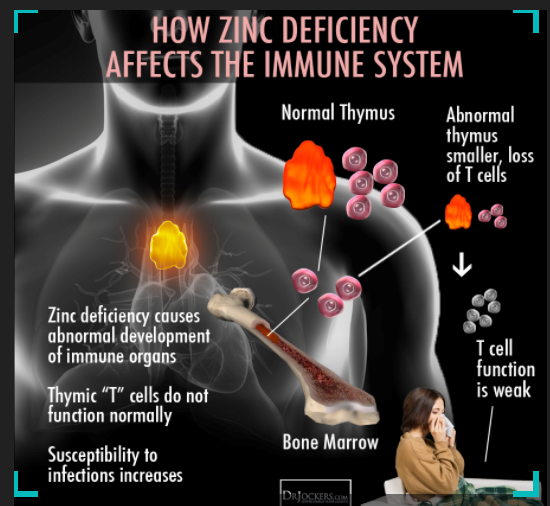
Image Source: https://drjockers.com/15-zinc-deficiency-symptoms/
Zinc is essential for virtually all processes in the human body. Observations during zinc deficiency indicate that the absence of zinc severely impairs the immune response.
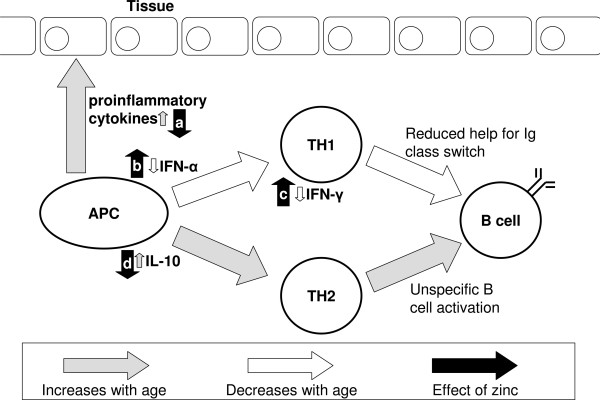
8
The Role of Zinc in Antiviral Immunity
Zinc status is a critical factor that can influence antiviral immunity, particularly as zinc-deficient populations are often most at risk of acquiring viral infections such as HIV or hepatitis C virus. This review summarizes current basic science and clinical evidence examining zinc as a direct antiviral, as well as a stimulant of antiviral immunity. An abundance of evidence accumulated over the past 50 years demonstrates the antiviral activity of zinc against a variety of viruses, via numerous mechanisms. The therapeutic use of zinc for viral infections such as herpes simplex virus and the common cold has stemmed from recent findings.
The antiviral properties of zinc are certainly virus-specific, but it appears that zinc ion availability plays a significant role in the general antiviral efficacy of zinc.
When high doses of ionic zinc are used in clinical studies, a clear reduction in cold duration of 42% has been calculated. Whether this was caused by viral inhibition, improved local immune response, or an amelioration of symptoms remains uncertain.
Research shows that severe acute respiratory syndrome (SARS) coronavirus was inhibited by zinc in Vero-E6 cells. Moreover, zinc salts were shown to inhibit respiratory syncytial virus, even while zinc was incubated with HEp-2 cells only before infection, and then removed.29
Zinc and the Treatment of Severe Pneumonia
One of the most serious conditions associated with the flu is pneumonia, and it’s also one of the most common reasons for death associated with influenza. An analysis of randomized, double-blind, and placebo-controlled trials shows that zinc is highly effective when given as an adjunct in the treatment of severe pneumonia.
Methods: PubMed, Embase, MEDLINETM and the Cochrane Central Register of Controlled Trials were searched to identify all randomized, double-blind and placebo-controlled (DBPC) trials which evaluated the clinical efficacy of zinc given as an adjunct in the treatment of severe pneumonia and published between January 1966 and October 2015.
Results: Six randomized DBPC trials including 2216 patients with severe pneumonia were eligible. The results suggested that zinc given as an adjunct therapy to the treatment of severe pneumonia had no significant improvement of treatment failure (RR = 0.97, P = .71) and change of antibiotic therapy (RR = 1.09, P = .52). We also found a favorable trend for clinical deterioration of severe pneumonia but with no statistical significance (RR = 0.88, P = .55). Zinc produced a significant reduction in mortality caused by severe pneumonia (RR = 0.43, P = .01).
Conclusions: Zinc given as an adjunct to the treatment of severe pneumonia is effective in reducing the mortality of severe pneumonia, and has no significant effects on treatment failure and change of antibiotic therapy.9
Zinc Supplementation Improves Recovery in Respiratory Infections
Other studies have shown zinc supplementation is highly effective in supporting recovery from severe respiratory infections. A study of children with acute pneumonia reported:
Bangladesh – 30% reduction in the duration of illness in severe pneumonia.
India – 2.6 times increase in recovery rates from severe respiratory infections.
Nepal – More than 2600 children enrolled in a study to find the impact of zinc as an adjunctive therapy in pneumonia.10
Zinc was also found to have a therapeutic benefit in seven trials of acute diarrhea and five of persistent diarrhea. Studies to evaluate the effect of zinc supplementation on mortality are under way, but a recently published study from India identified a 68% reduction in mortality in small-for-gestational-age term infants that were supplemented with zinc from 1 to 9 mo of age.11
Many Studies Support Zinc for Immunity
A wide range of animal and human studies support the use of zinc in bolstering immunity. Consider the following examples:
Research shows that zinc supplementation for pigs during weaning improves adaptive immunity, as seen by increased numbers of CD3+ T cells as well as increased numbers of CD3+CD4+Foxp3+ regulatory T cells, elevated interleukin (IL)-2 production and decreased IL-10 production.12
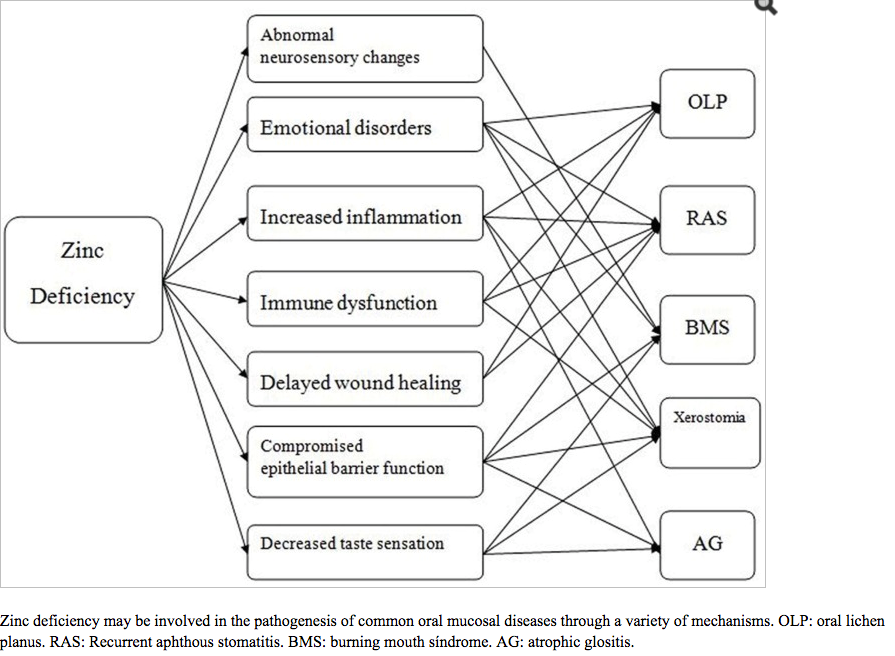
13
Zinc deficiency results in immune dysfunction in innate and adaptive immunity
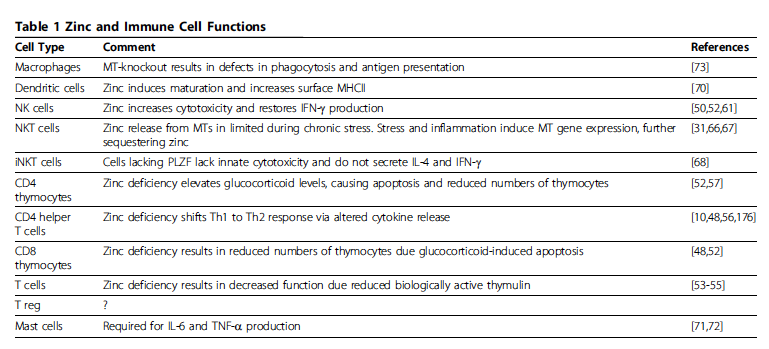
14
Zinc interferes with IFN-l3 binding to IFNL receptor 1 (IFNLR1), resulting in decreased antiviral activity and increased viral replication (HCV, influenza) in vitro.
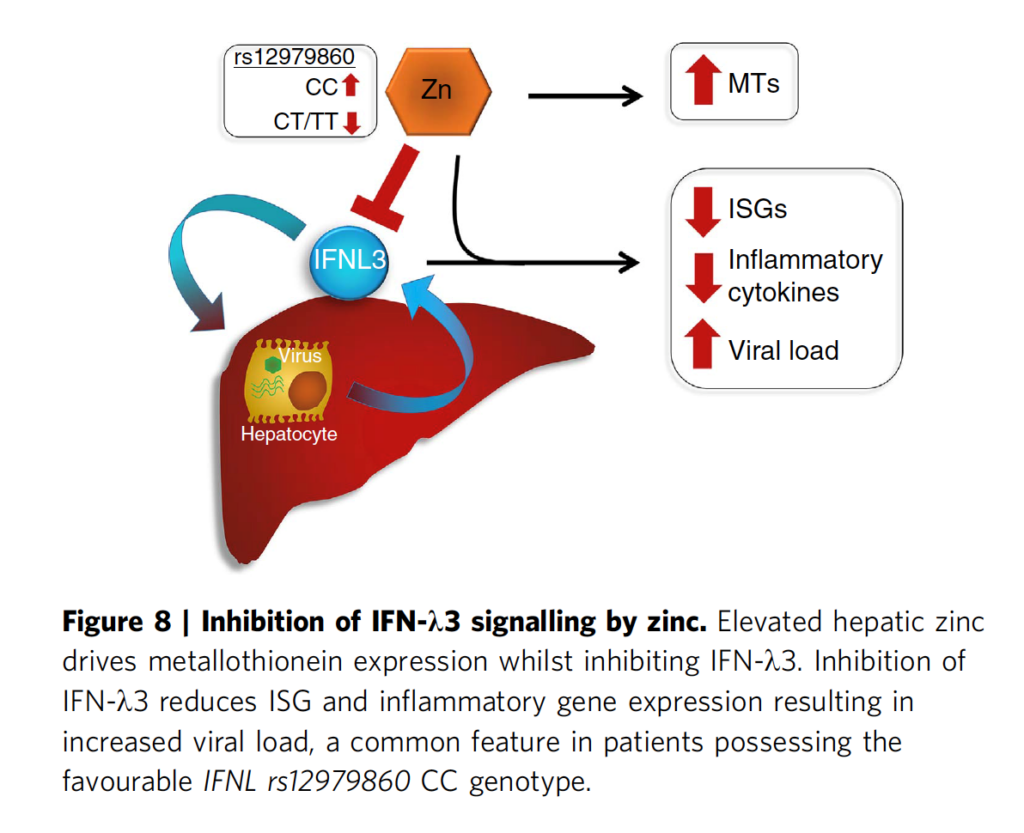
Hepatitis C virus patients with high zinc levels have low hepatocyte antiviral and inflammatory gene expression and high viral loads, confirming the inhibitory role of zinc in vivo.15
Oral zinc has been shown to reduce the length and severity of a cold and common flu.16
In people with zinc deficiency, activity of serum thymulin (a thymus specific hormone involved in T cell function) is decreased, an imbalance between T helper cell (Th1) and Th2 function develops, and lytic activity of natural killer cells and the percentage of precursors of cytolytic T cells is decreased.17,18
Zinc deficiency increases oxidative stress resulting in activation of monocytes-macrophages and generation of inflammatory cytokines. Th2 functions were not affected due to zinc deficiency.19
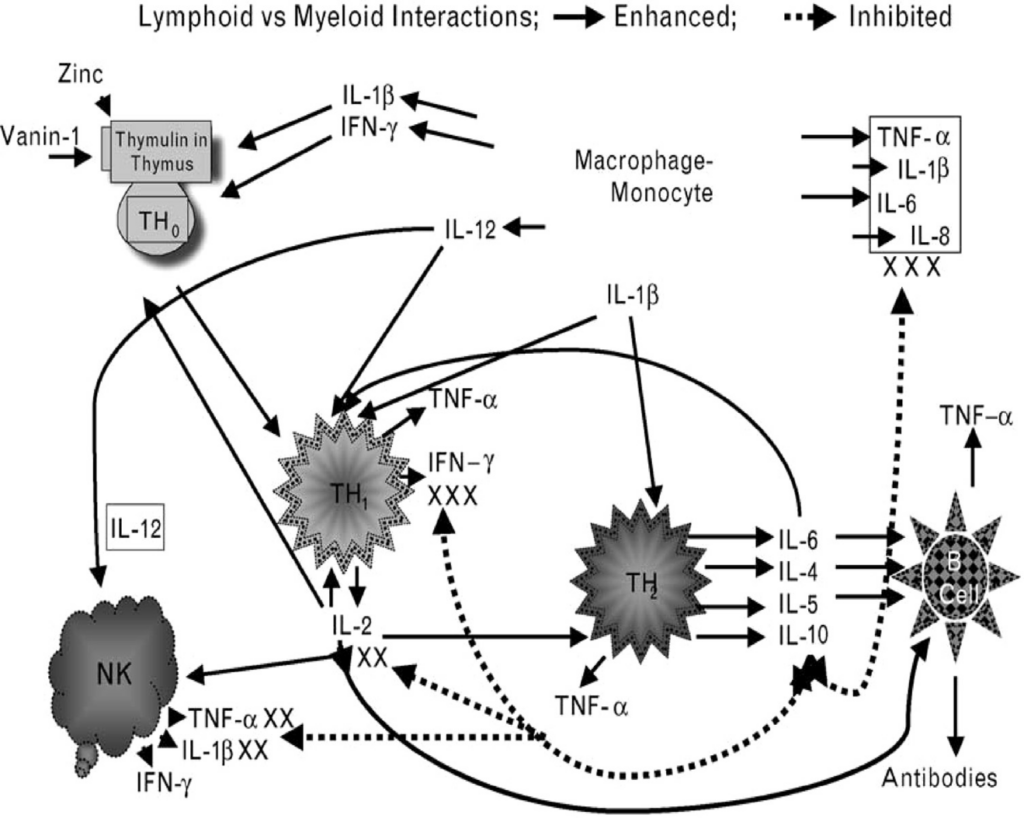
Zinc has an important role in cell-mediated immune functions and also functions as anti-inflammatory and antioxidant agent.20
The Most Effective Form of Zinc
In the infinite wisdom of nature, whole foods contain a complex array of vitamins, minerals, phytochemicals, enzymes, and other beneficial compounds. These essential nutrients and cofactors enhance cellular health, cell signaling, enzyme system response, and other activities that support physiological homeostasis. Naturized® whole food nutrients are delivered in the context of a whole food matrix that facilitates their bioavailability.
This matrix includes peptide carriers and cofactors naturally occurring in foods that act as chaperones, delivering nutrients to the cells and tissues of the body. Human physiology is designed to obtain nutrients from plants and natural foods. Naturized® nutrients are unique in that they emulate whole foods while delivering a higher concentration of specific vitamins or minerals.
Zinc (Naturized®) from S. cerevisiae offers excellent bioavailability via a food matrix that facilitates delivery into the cells for utilization. This biological source of zinc is also rich in proteins, peptides, and amino acids.
Laboratory studies have found zinc-enriched S. cerevisiae (Naturized® zinc) to be 3.7 times more bioavailable than zinc gluconate.21 Other studies show Naturized® zinc to be significantly more bioavailable than zinc chelate and zinc orotate.22 In human studies, the net zinc balance in healthy humans, as measured through collection of urine, blood, and fecal samples, was significantly higher in those taking Naturized® zinc than in those taking zinc gluconate salts.23
Zinc Status and Autoimmunity: A Systematic Review and Meta-Analysis
To examine the experimental evidence reported in the literature regarding zinc levels in patients with autoimmune disorders compared to control individuals, a systematic review and meta-analysis were performed. From a large body of research—26,095 articles identified by literature search—only 179 were considered potentially relevant for this particular study, and of those, only 62 satisfied the inclusion criteria. In their painstaking evaluation, the researchers found that the zinc concentration in both serum and plasma samples of autoimmune disease patients was significantly lower than in the controls.24
Zinc Supplementation for the Treatment of Measles in Children
Despite increasing vaccine coverage, measles continues to be a significant cause of childhood morbidity and mortality globally. Zinc plays an important role in the maintenance of normal immunological functions, and researchers conclude that supplements given to zinc‐deficient children will increase the availability of zinc and could reduce measles‐related morbidity and mortality.25
Zinc and Sepsis
Sepsis, defined as a “life-threatening organ dysfunction caused by a dysregulated host-response to infection” is a major health issue worldwide and still lacks a fully elucidated pathobiology and uniform diagnostic tests.
However, the trace element zinc is known to be crucial to ensure an appropriate immune response. During sepsis a redistribution of zinc from serum into the liver has been observed and several studies imply a correlation between zinc and sepsis outcome. Therefore, the alterations of zinc concentrations in different tissues might serve as one part of the host’s defense mechanism against pathogens during sepsis by diverse mechanisms. It has been suggested that zinc is involved in nutritional immunity, acts as a hepatoprotective agent, or a differentiation signal for innate immune cells, or supports the synthesis of acute phase proteins.
Further knowledge about these events could help in the evaluation of how zinc could be optimally applied to improve treatment of septic patients. Moreover, the changes in zinc homeostasis are substantial and correlate with the severity of the disease, suggesting that zinc might also be useful as a diagnostic marker for evaluating the severity and predicting the outcome of sepsis.26
Final Thoughts on Zinc, and Why It’s So Important Now
There is no question that zinc is an essential trace element for all living organisms and their biological processes. Zinc plays a key role in more than 300 enzymes and is involved in cell communication, proliferation, differentiation and survival. Zinc plays also a role in regulating the immune system with implications in pathologies where zinc deficiency and inflammation are observed.27
We know that zinc is critical for the immune system. Of all age groups, the elderly have an increased probability for zinc deficiency, documented by a decline of serum or plasma zinc levels. Zinc deficiency in the elderly may impair zinc-dependent signaling, and thereby immune function. 28
In addition, zinc is essential for NK cell status and response. The main functions of NK cells are the elimination of cancer or virus infected cells, and the higher incidence of viral infections and cancer in the elderly may well be related to impairment of NK cell function.29
As we face a global pandemic, it’s more important than ever that we have readily available tools to support our health and immune function. Zinc is a foundational nutrient that I recommend for enhancing immunity, and I suggest it to all of my patients.
References:
- Prasad, A. S. Zinc: role in immunity, oxidative stress and chronic inflammation.\Curr. Opin. Clin. Nutr. Metab. Care 12, 646–652 (2009).
- Prasad, A. S. Zinc in human health: effect of zinc on immune cells. Mol. Med. 14, 353–357 (2008).
- Andreini, C., Banci, L., Bertini, I. & Rosato, A. Counting the zinc-proteins encoded in the human genome. J Proteome Res. 5, 196–201 (2006).
- Berg, J. M. & Shi, Y. The galvanization of biology: a growing appreciation for the roles of zinc. Science 271, 1081–1085 (1996).
- Haase H, Rink L. Multiple impacts of zinc on immune function. Metallomics. 2014 Feb 17. 10.
- Prasad AS. Zinc in human health: effect of zinc on immune cells. Mol Med. 2008 May-Jun. 14(5-6):353-7. doi: 10.2119/2008-00033.
- 11. Shankar AH, Prasad AS. Zinc and immune function: the biological basis of altered resistance to infection. Am J Clin Nutr. 1998 Aug. 68(2 Suppl):447S-4463S.
- Smailhodzic D, van Asten F, et al. The immune system and the impact of zinc during aging. Immunity & Aging. 2009. 6:9. PLOS ONE. 2014 Nov. 9(11):1-10. 24.
- Linlin Wang 1, Yuanlin Song, Efficacy of Zinc Given as an Adjunct to the Treatment of Severe Pneumonia: A Meta-Analysis of Randomized, Double-Blind and Placebo-Controlled Trials, Clin Respir J, 12 (3), 857-864 Mar 2018.
- Maulidi R. Fataki,1 Rodrick R. Kisenge,1 Christopher R. Sudfeld,3 Said Aboud,2 James Okuma,4 Saurabh Mehta,7 Donna Spiegelman,3,5 and Wafaie W. Fawzi, Effect of Zinc Supplementation on Duration of Hospitalization in Tanzanian Children Presenting with Acute Pneumonia, J Trop Pediatr. 2014 Apr; 60(2): 104–111. Published online 2013 Nov 5. doi: 10.1093/tropej/fmt089
- Kloubert V, Blaabjerg K, Dalgaard TS, Poulsen HD, Rink L, Wessels I. Influence of zinc supplementation on immune parameters in weaned pigs. J Trace Elem Med Biol. 2018 Sep;49:231-240. doi: 10.1016/j.jtemb.2018.01.006.
- Bao ZX, Yang XW, Shi J, Liu LX. Serum zinc levels in 368 patients with oral mucosal diseases: A preliminary study. Med Oral Patol Oral Cir Bucal. 2016 May 1;21(3):e335-40.
- Scott A. Read1, Kate S. O’Connor2, Vijay Suppiah3, Chantelle L.E. Ahlenstiel4, Stephanie Obeid1, Kristina M. Cook5, Anthony Cunningham6, Mark W. Douglas1,7, Philip J. Hogg8, David Booth2, Jacob George1 & Golo Ahlenstiel1, Zinc is a potent and specific inhibitor of IFN-l3 signalling NATURE COMMUNICATIONS | 8:15245 | DOI: 10.1038/ncomms15245 |www.nature.com/naturecommunications, Received 25 Sep 2015 | Accepted 12 Mar 2017 | Published 17 May 2017
- Mousa HA. Prevention and Treatment of Influenza, Influenza-Like Illness, and Common Cold by Herbal, Complementary, and Natural Therapies.J Evid Based Complementary Altern Med 2017 – Review. PMID 27055821 Free PMC article.
- John et al. Journal of Translational Medicine 2010, 8:118, http://www.translational-medicine.com/content/8/1/118
- Prasad AS, Meftah S, Abdallah J, Kaplan J, Brewer GJ, Bach JF. Serum thymulin in human zinc deficiency. J Clin Invest 1988; 82: 1202-1210[Medline]. 11.
- Fitzgerald JT, Brewer GJ. Changes in cytokines production and T cell subpopulations in experimentally induced zinc-deficient humans. Am J Physiol 1997; 272: E1002-E1007.
- Ananda S. Prasad Impact of the discovery of human zinc deficiency on health; Journal of Trace Elements in Medicine and Biology 28 (2014) 357-363.
- Ananda S. Prasad, Zinc: Mechanisms of Host Defense, The Journal of Nutrition, Volume 137, Issue 5, May 2007, Pages 1345-1349.
- Black, Robert E. Zinc Deficiency, Infectious Disease and Mortality in the Developing World The Journal of Nutrition, Volume 133, Issue 5, May 2003, Pages 1485S–1489S, https://doi.org/10.1093/jn/133.5.1485S.
- Vinson JA, Tompkins TA, Agbor GA. Comparative bioavailability of mineral-enriched gluconates and yeast in rat liver after depletion-repletion feeding. Biol Trace Elem Res. 2007 Aug. 118(2):104-110.
- Vinson JA, Bose P. Comparison of the bioavailability of trace elements in inorganic salts, amino acid chelates and yeast. Proceedings on Mineral Elements. 1981. p615-621.
- Tomkins TA, Renard NE, Kiuchi A. Clinical evaluation of the bioavailability of zinc-enriched yeast and zinc gluconate in healthy volunteers. Biol Trace Elem Res. 2007 Winter. 120(1-3):28-35.
- Alessandro Sanna,1 Davide Firinu,2 Patrizia Zavattari,3,* and Paolo Valera1,* Zinc Status and Autoimmunity: A Systematic Review and Meta-Analysis, Nutrients. 2018 Jan; 10(1): 68. Published online 2018 Jan 11. doi: 10.3390/nu10010068
- Ajibola A Awotiwon, Olabisi Oduwole, Anju Sinha, and Charles I Okwundu Zinc supplementation for the treatment of measles in children, Cochrane Database Syst Rev. 2017 Jun; 2017(6): CD011177. Published online 2017 Jun 20. doi: 10.1002/14651858.CD011177.pub3.
- Wiebke Alker 1 2, Hajo Haase 3 4 Zinc and Sepsis, Nutrients, 10 (8) 2018 Jul 27, DOI: 10.3390/nu10080976.
- Scott ARead,1,2 Stephanie Obeid,3 Chantelle Ahlenstiel,3 and Golo Ahlenstiel, The Role of Zinc in Antiviral Immunity, American Society for Nutrition 2019. All rights reserved. Adv Nutr 2019;10:696–710; doi: https://doi.org/10.1093/advances/nmz013
- Haase H, Mocchegiani E, Rink L. Correlation Between Zinc Status and Immune Function in the Elderly, Biogerontology. 2006 Oct-Dec; 7(5-6):421-8.
- Hajo Haase1 and Lothar Rink1 The immune system and the impact of zinc during aging, Immun Ageing. 2009; 6: 9. Published online 2009 Jun 12. doi: 10.1186/1742-4933-6-9


Donnie,
Gino stated it best at the gala for your foundation that we attended. When he stated that you know your stuff.
You ABSOLUTELY know your stuff.
Donnie, this is so helpful, and I love all of the research that supports it. Thanks for getting this out so people can know what steps to take to help themselves and their families!
Gratitude, Donnie, for this . As usual, your information is compelling, and thorough . But this is no surprise; you have been teaching about the importance of which nutrients and herbs strengthen immunity , etc. for as long as I have known you, which is almost 30 years, Your insights have always been at the forefront.
Thanks Donnie. I always want to know about dosage for Zinc (Naturized®. What would you recommend?